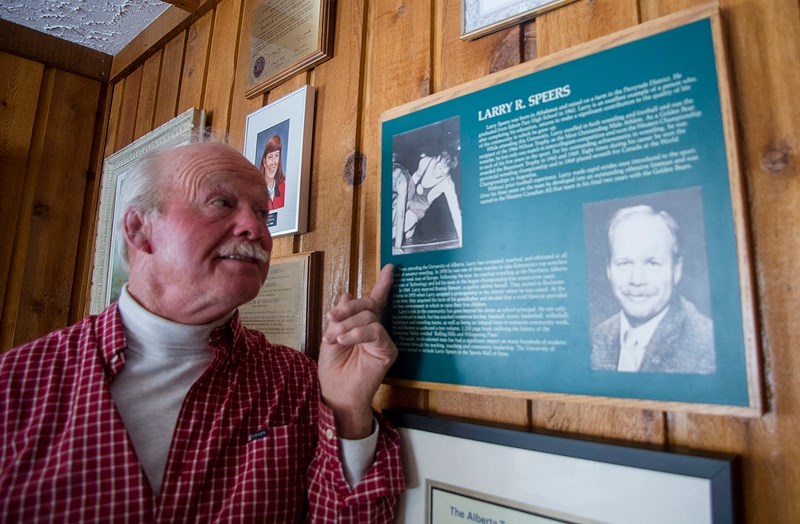As a country boy, he had never ridden the train before, except for a quick thrill jumping onto the blurring railway cars while they passed through Athabasca County to somewhere else.
When Larry Speers actually sat on the cushions of a train for the first time, he was on his way to attend the University of Alberta in 1962 in the Faculty of Education.
He was being transported into what would become a decorated sports career.
In his first years competing as a U of A Golden Bear, Speers won all of his wrestling matches against young men who had already been in the sport for up to five years, while it was Speers’ first year on the mat competitively. He continued to pin every competitor who faced him on the mats, and only experienced his first loss in his fourth year on the university wrestling team.
“We all have gifts. I guess one of mine was strength,” Speers said. “When you’re a strong country boy, and you work a program every day on the farm, cutting wood and stocking bundles; lifting bales and rocks; riding horses … you work all the time.”
Speers’ loss in his fourth year was his only loss as a Golden Bear athlete, and he won the Western Championship in each of his five years in the sport. In 1966, he was awarded the Wilson Trophy as the Most Outstanding Male Athlete for his excellence in both wrestling and football, and he was awarded the U of A Beaumont Cup in both 1963 and 1964 as as the Golden Bears’ most valuable wrestler.
“There’s nothing like wrestling, because you’re going to go out there, and it’s you and this other fellow out there on the mat,” Speers said. “There’s nothing as gut-wrenching or fearful, or butterflies-in-your-stomach as wrestling.”
Speers remembers with clarity the competition where his impeccable wrestling record was tarnished – but not for having been defeated .
It was 1965, the intercollegiate finals at the University of British Columbia.
After he lost that one fight to an athlete from the University of Saskatchewan, Speers found himself up against a strong wrestler from UBC. The Western Canada team competition was on the line.
“I was determined to win,” Speers said. “I don’t think it took me very long. I went out, took his single leg and tipped him right over, pinned him maybe in a matter of a minute.”
His first loss was then redeemed, because he had just won the intercollegiate final, along with the team championship for Western Canada.
“I was mobbed by my teammates,” he said.
In 1969, Speers placed on the Canadian National Wrestling Team after an extreme selection process, and he travelled all the way to Mar del Plata, Argentina to represent Canada on the world stage.
That March, Speers competed against all the “strong wrestling countries” like Russia, Bulgaria, Turkey, Japan and the United States. He won two matches, and ended up doing better than the other nine Canadian competitors.
“You’re going against the very best of the best. It was something extraordinary,” he said. “It was emotional because you’re representing your country, and you go out there … there’s tears in everybody’s eyes when you’re representing your country, and all the other teams march out into the arena.”
Speers ended up seventh in his weight class out of 13 athletes at the world championship.
Dave Duniec grew up playing baseball with Speers in Athabasca County, and later competed alongside him on the U of A Golden Bears wrestling team. Duniec said Speers was a “true athlete.”
“On the mat, once he crossed the line of competition he was a fierce competitor – very organized and very talented, a true athlete. He had everything going for him,” he said. “Off the mat, (Speers) never bragged about his exploits in sports; he was humble off the mat.”
Hanging amidst a collection of awards on Speers’ farmhouse dining room wall is a particularly special one.
In 1988, Speers was inducted into the University of Alberta Sports Wall of Fame, and the plaque lists Speers’ many sporting accomplishments, but also recognizes the “significant impact” the “quiet, multi-talented man” has had on “many hundreds of students and athletes” through his teaching and coaching career.
Speers is humble about his accomplishment in sports, but freely brags about the many county championships and provincials his students have championed.
After completing his education degree, Speers spent three years coaching the Golden Bears football team, and six coaching the Northern Alberta Institute of Technology (NAIT) Ooks wrestling team. In his coaching capacity, the NAIT Ooks won five college championships in a row.
After six years, Speers “was ready to come back” to the Athabasca area. He continued to teach for 40 years at Rochester School and Edwin Parr Composite School, and coached every sport imaginable.
“You teach in the classroom or on the field, in the lab, but at the end of the day you get to work with those students who love being there, who give you everything they’ve got on the field, in the gym floor, in the hockey arena,” Speers said. “That’s where the students really have a different attitude towards learning.”
Speers’ Sports Wall of Fame plaque describes him as an “excellent example of a person who, after completing his education, returns to make a significant contribution to the quality of life of the community in which he grew up.”
Speers retired in 2000, and said in his 23 years coaching at Rochester School his students won 21 county championships for various sports, but it was not only about the athletics.
“It wasn’t just me – it was the teachers,” he said. “When you catch the attention, and the kids love where they are, what they’re doing … success builds success.”
“We just did it, and the kids loved it. They have a love for learning and competing.”



